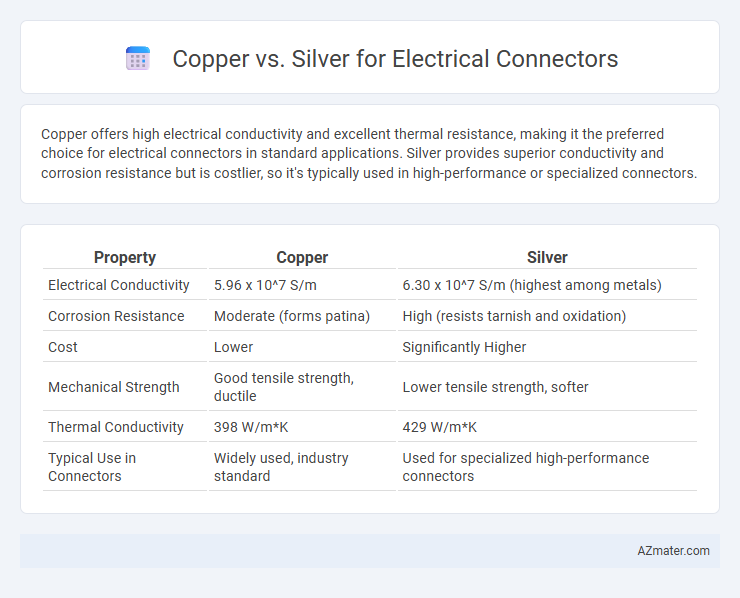Copper offers high electrical conductivity and excellent thermal resistance, making it the preferred choice for electrical connectors in standard applications. Silver provides superior conductivity and corrosion resistance but is costlier, so it's typically used in high-performance or specialized connectors.
Table of Comparison
| Property | Copper | Silver |
|---|---|---|
| Electrical Conductivity | 5.96 x 10^7 S/m | 6.30 x 10^7 S/m (highest among metals) |
| Corrosion Resistance | Moderate (forms patina) | High (resists tarnish and oxidation) |
| Cost | Lower | Significantly Higher |
| Mechanical Strength | Good tensile strength, ductile | Lower tensile strength, softer |
| Thermal Conductivity | 398 W/m*K | 429 W/m*K |
| Typical Use in Connectors | Widely used, industry standard | Used for specialized high-performance connectors |
Introduction to Electrical Connectors
Electrical connectors require materials with excellent conductivity and durability, making copper and silver prime candidates. Copper offers high electrical conductivity, corrosion resistance, and affordability, widely used in electrical connectors for reliable performance. Silver surpasses copper in conductivity and offers superior thermal performance, but its higher cost limits usage to specialized applications requiring optimal electrical efficiency.
Importance of Material Selection in Connectors
Copper's superior electrical conductivity and corrosion resistance make it a preferred choice for electrical connectors, ensuring minimal signal loss and reliable performance. Silver offers the highest conductivity but is often limited by cost and susceptibility to tarnishing, which can degrade connector efficiency over time. Selecting the appropriate material directly impacts connector durability, signal integrity, and overall system reliability in demanding electrical applications.
Physical Properties: Copper vs Silver
Copper exhibits excellent electrical conductivity at approximately 5.96 x 10^7 S/m and is highly malleable, facilitating easy manufacturing of electrical connectors. Silver surpasses copper in conductivity, reaching about 6.30 x 10^7 S/m, and offers superior resistance to oxidation, enhancing connector durability. Both metals possess high thermal conductivity, but silver's slightly better performance aids in efficient heat dissipation during high-current applications.
Electrical Conductivity Comparison
Copper exhibits an electrical conductivity of approximately 5.96 x 10^7 S/m, making it highly efficient for electrical connectors due to its excellent ability to carry current with minimal resistance. Silver surpasses copper with the highest electrical conductivity among metals at about 6.30 x 10^7 S/m, enabling even lower power losses and superior signal transmission in connectors. Despite silver's conductivity advantage, copper remains the preferred choice for most electrical connectors because of its optimal balance between conductivity, cost, and mechanical durability.
Corrosion Resistance and Durability
Copper electrical connectors offer excellent corrosion resistance due to their natural oxide layer, which helps maintain conductivity over time, while silver connectors provide superior corrosion resistance in harsh environments because silver's oxide layer is more conductive and less prone to degradation. In terms of durability, copper connectors are highly durable under normal conditions but may tarnish and require maintenance in high humidity or corrosive atmospheres, whereas silver connectors excel in durability by resisting oxidation and maintaining low contact resistance even in aggressive environments. Choosing between copper and silver connectors depends on the specific environmental conditions and long-term performance requirements of the electrical system.
Cost Analysis: Copper vs Silver
Copper offers a significantly lower cost per pound compared to silver, making it the more economical choice for electrical connectors in large-scale applications. Silver, while more expensive, provides superior electrical conductivity and corrosion resistance, which can reduce maintenance costs in high-performance or specialized environments. Cost analysis must balance initial material expenses with long-term performance benefits, considering factors like conductivity efficiency, durability, and environmental conditions.
Solderability and Workability
Copper offers excellent solderability due to its strong affinity with common solder alloys and its ability to form reliable, corrosion-resistant joints, making it a preferred choice for electrical connectors. Silver, while possessing superior electrical conductivity, presents challenges in solderability because of its tendency to form surface oxides that hinder solder wetting, requiring special fluxes or soldering conditions. Regarding workability, copper is more ductile and easier to shape or machine, whereas silver's softness demands careful handling to avoid deformation during connector fabrication.
Common Applications of Copper Connectors
Copper connectors dominate electrical applications due to their excellent conductivity, corrosion resistance, and cost-efficiency, making them ideal for residential wiring, automotive systems, and industrial equipment. Common applications include power distribution panels, grounding systems, and telecommunications infrastructure, where reliable electrical transmission is critical. Their strong mechanical strength and thermal conductivity also ensure durability in high-load and high-temperature scenarios.
Common Applications of Silver Connectors
Silver connectors are widely used in high-performance electrical applications such as aerospace, telecommunications, and medical devices due to their superior conductivity and corrosion resistance. Their exceptional ability to conduct electricity efficiently makes them ideal for high-frequency signal transmission and precision instrumentation. Silver connectors also excel in harsh environments where reliable contact and minimal electrical resistance are critical.
Choosing the Right Material for Your Electrical Connector
Copper offers excellent electrical conductivity and durability, making it a preferred choice for electrical connectors in most applications. Silver, while providing the highest electrical conductivity among metals, is costlier and prone to tarnishing, which can impact long-term connector performance. Select copper for cost-effective, reliable connections, especially in environments where corrosion resistance and mechanical strength are critical, while silver is ideal for high-frequency or precision applications requiring superior conductivity despite higher expenses.

Infographic: Copper vs Silver for Electrical Connector
 azmater.com
azmater.com